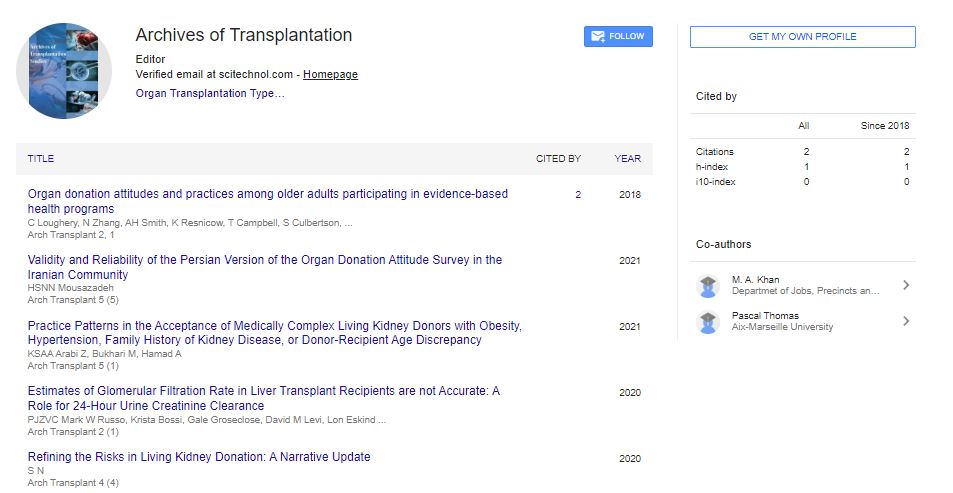Commentary, Arch Transplant Vol: 7 Issue: 2
Matching Organs and Recipients Complexities of Compatibility in Transplantation
Yang Cao*
1Department of Surgery, Huazhong University, Wuhan, China
*Corresponding Author: Yang Cao,
Department of Surgery, Huazhong
University, Wuhan, China
E-mail: yangc@tp23456.cn
Received date: 23 May, 2023, Manuscript No. AT-23-107819;
Editor assigned date: 26 May, 2023, PreQC No. AT-23-107819 (PQ);
Reviewed date: 12 June, 2023, QC No. AT-23-107819;
Revised date: 19 June, 2023, Manuscript No. AT-23-107819 (R);
Published date: 26 June, 2023 DOI: 10.4172/AT.1000143
Citation: Cao Y (2023) Matching Organs and Recipients Complexities of Compatibility in Transplantation. Arch Transplant 7:2.
Description
Organ transplantation is a life-saving procedure that depends on the successful matching of organs and recipients. The process of matching organs and recipients involves intricate considerations to ensure compatibility and minimize the risk of rejection. Understanding the intricacies of organ and recipient matching is important for optimizing transplant outcomes and increasing the chances of long-term graft survival. Matching organs and recipients involves a comprehensive evaluation of multiple factors.
The primary consideration is the type of organ being transplanted, as each organ has unique compatibility requirements. For example, in kidney transplantation, factors such as blood type, Human Leukocyte Antigen (HLA) compatibility, and donor-recipient size matching are essential. HLAs play a significant role in organ and recipient matching. HLAs are proteins present on the surface of cells that help the immune system recognize self and non-self. The closer the HLA match between the donor and recipient, the lower the risk of rejection. HLA matching is particularly important in solid organ transplantation, where compatibility reduces the likelihood of immune-mediated rejection.
Other factors considered include blood type compatibility and the presence of pre-existing antibodies in the recipient's blood. Blood type compatibility is essential to prevent immediate rejection due to incompatible blood group antigens. For example, ABO blood group compatibility is essential in heart and liver transplantation. Preexisting antibodies, especially donor-specific antibodies, can lead to antibody-mediated rejection and are evaluated through cross matching tests before transplantation. Finding suitable donors presents significant challenges in organ and recipient matching. The demand for organs far exceeds the supply, leading to prolonged waiting times and a limited pool of available organs.
The scarcity of suitable donors is influenced by several factors. First, there are restrictions related to the age and medical condition of donors. Advanced age and specific medical conditions may render organs unsuitable for transplantation. Second, the requirement for optimal organ preservation limits the geographical range within which organs can be transported. The limited time frame for organ viability can be a barrier, especially for organs that have shorter preservation times, such as hearts and lungs. Furthermore, the need for compatibility in terms of size and anatomy further reduces the pool of suitable donors. For example, in pediatric transplantation, finding appropriate-sized organs for children poses unique challenges. The scarcity of pediatric donors and the need for size-matching make it particularly challenging to find suitable organs for young recipients.
Advancements in medical science and technology have helped improve compatibility in organ transplantation. One of the significant advancement is the development of better immunological testing methods. Highly sensitive HLA typing and crossmatching techniques allow for more accurate assessment of donor-recipient compatibility and reduce the risk of immune-mediated rejection. Advancement is the utilization of paired exchange programs or kidney exchange programs. These programs enable incompatible donor-recipient pairs to exchange kidneys with other pairs, allowing for compatible matches to be made. This approach expands the pool of potential donors and increases the chances of finding suitable matches.
In addition, advancements in immunosuppressive medications and protocols have played a crucial role in improving compatibility. These medications suppress the recipient's immune response, reducing the risk of rejection. Tailoring immunosuppression regimens to individual patients and optimizing the balance between immunosuppression and the risk of infections or other complications have improved transplant outcomes and increased graft survival rates.
